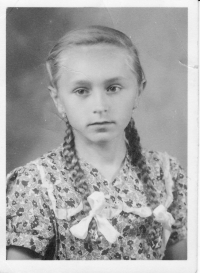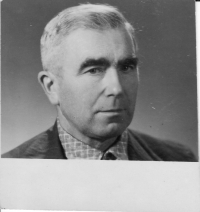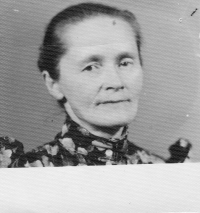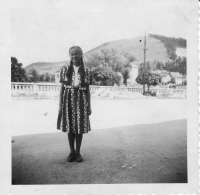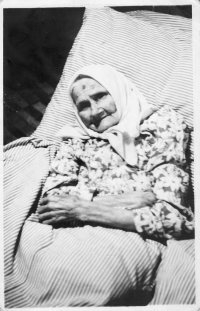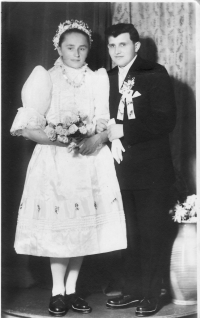Anna Daňková, rod. Kováčová
* 1938
-
"Soldiers marched down the village. Suddenly the two of them separated and came to us. At that time we already had a brick house built, and the one came and said, 'Here the rectory, the tavern, give lošaď.' They came to my father. I thought these were my first russian words that I remember. Such a girl. And the father said, 'I don't have horses, but I have oxen. If you want, I'll give them to you, but I don't have horses. 'So he headed a submachine- gun at my father to shoot him. There were two of them, this one was blond and the other one was black, of a different skin, and he stopped him from shooting. There were about fifteen children here in the cellar, the submachine gun also headed at us for shooting everyone. The children were screaming. Fortunately, nothing happened to anyone. However, he still headed gun at my father's head and wanted to shoot him. My father was shaking and I was standing by him, I liked him very much. "
-
"It was already evening when we loaded the wagon. It was raining. There were water holes on the ground. I was ashamed that the guys were helping me. So I stood by the wagon to put the sacks on my back. I got the biggest bag I fell down into the mud. 'You are ass! You don't see that she's a girl ?! Why are you giving it to her? 'Shouted the man behind me at the man who was loading the bags and standing in the wagon. I have not seen it. Well, when you were standing here, 'he replied. “Put the bag on the weighing-machine!” The bag was fifty-four kilograms. 'Now stand on the weighing-machine,' the man told me. I had forty-eight kilograms. The bag was heavier. Well, I had experiences like these, both in crying and in laughter. Only later, I realized how these days of pain passed. But nothing, it's over. "
-
“Where are the golden goblets?' 'He didn't have golden goblets, he only had a glass goblet, but he didn't have golden goblets,' I replied. Then they sent me to the other room. They consulted in the kitchen, and one of them said, 'I would put this girl in jail.' The other said, 'You can't lock her up, can't you see she's still a baby? After all, the future will be inflamed. ”They sent me out saying that I should go and call my mother, who was working in the field. 'She's far away.' 'You'll go,' they said. It was about one o'clock. They also said I should run. The weather was chilly and I really didn't run or run. I came up the hillside and my mother and grandparents knew that something had happened. I didn't come to help them to dig and I didn't change my clothes from school. "Mom, come home, they came and broke the door with an ax, and I came for you, to go home." Our grandparents remained a little alive, poor. Mom and I returned, but they wouldn't let us in. We had to stand under the window. "
-
Full recordings
-
Dlhá nad Oravou, 01.03.2020
(audio)
duration: 01:19:59
-
Dlhá nad Oravou, 04.03.2020
(audio)
duration: 56:59
Full recordings are available only for logged users.
“I lost all the illusions of that life.”
Anna Daňková, as single Kováčová, was born on November 15, 1938 in Dlhá nad Oravou. He comes from a peasant family. The parents were addicted to agriculture together with their two daughters, the elder Maria and the younger Anna, and with the grandparents Jozef and Johana Ťapák. Anna completed basic nine-year schooling alternately in Dlhá nad Oravou and Dolný Kubín. In the 1950s, the Kováč family was prosecuted for hiding the priest Juraj Gabur. This was also one of the reasons why she did not continue with further studies. The communist regime severely affected the whole family and in 1953 it imprisoned her father Pavol Kováč, mother Anna Kováčová and sister Mária Kováčová. As a 15-years-old, Anna stayed at home with only her grandparents and aunt Helena Paleková (her grandfather and aunt were over eighty and her grandmother was seventy-five). Together with them, she took care of the farm, while they had to subserve the prescribed contingents. The family Daňková from Dlhá nad Oravou who had a son, Peter, helped her very often. In 1960, Anna married him. They remained to live in Anna’s house in birthplace, where they raised three children. They were addicted to agriculture. They currently still live in Dlhá nad Oravou.
